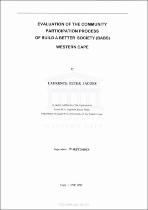| dc.description.abstract | The study was undertaken of Build A Better Society (BABS) Western Cape because a comparison of the membership and public profile of the organisation from the time of its inception to recent times showed a decrease in its activities. Feasible explanations in changes in the political system and funding priorities could be established to account for the reduction in community participation. However, there is a lack of information on community organisation projects in this country and, until recently, a dearth of literature on the subject of community participation as very few projects have been systematically evaluated and published which could have provided another explanation for the decrease. Registered as a welfare organisation, BABS is regarded as one of the pioneering community work organisations in Cape Town. It became a model for several organisations in the Western Cape who adopted its philosophy and formally constituted as affiliates. The aims, therefore, of the study were to examine whether the programmes of the organisation were successful in eliciting community participation, the extent of this involvement and whether this involvement was sustained over time: to describe the efforts of the staff and members in applying the techniques and procedures inherent in the community participation process; to describe the impact of this process on affiliated
organisations and to ascertain whether economic status or organisational structure had influenced the development of projects. The findings were to be compared to those of other studies. Community participation, in the context of the study, occurs when people take part in programmes they desire and are able to sustain their interest after external support has been phased out. The research methodology involved two surveys: • Interviews with the members and staff of BABS Western Cape in order to describe participation patterns and the impact of programmes on participants. • A study of available data which profiled the BABS organisations, their goals and programmes.
The data analysis was completed by the researcher. The findings indicate that community participation involved people becoming involved to a lesser or greater degree at different times in response to different issues. This suggested that there are several answers to the
question raised in regard to the decrease in the activities of BABS. The findings also suggest that major problems facing deprived areas, such as crime and housing, are beyond the resources and scope of neighbourhood development agencies. Finally, the recommendations call for BABS, which no longer functions as a grassroots community development agency, to institute a process of termination with its former
affiliates, to maximise the use of the Pegasus centre in Kewtown, and to continue in its new direction as a training organisation. Other recommendations provide suggestions with regard to their community participation strategies to other organisations seeking to enter
the field . | en_US |

